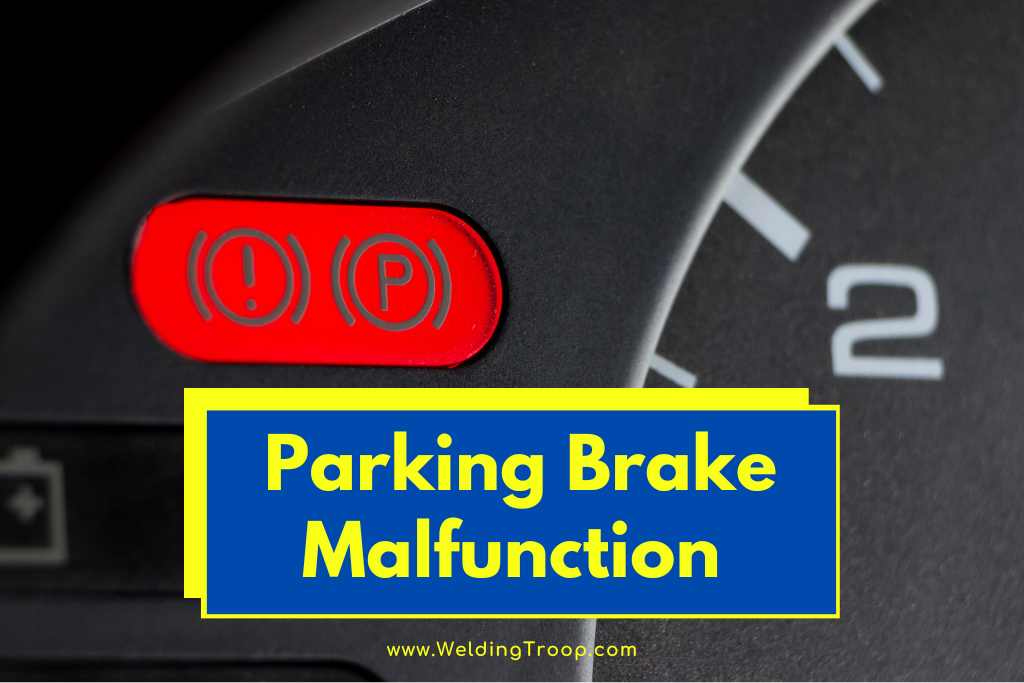The parking brake in your car plays several important roles. Aside from keeping your car still while it’s parked, it also acts as an emergency or e-brake to support your driving brakes. That’s why you should understand why it might malfunction and what you can do about it.
A parking brake will malfunction due to a corroded brake cable, faulty brake control, or a brake seizure. Besides that, a problematic sensor or a brake component failure can also cause the same problem.
Read through this guide to discover all you need to know about why your parking brake might malfunction.
Table of Contents
What Causes A Parking Brake To Malfunction?
A parking brake can malfunction for several reasons. Generally, though, the reasons are related to compartment failure or normal wear and tear.
Here are 5 reasons your parking brake can malfunction:
1. Corroded Brake Cable
A parking brake can malfunction due to corrosion along the brake cable.
First and foremost, let’s quickly recap how the parking brake works. The parking brake, sometimes known as the emergency brake, is not the same one that you engage by stepping on the brake pedal while driving.
Instead, it’s designed to use a separate mechanism that can act as a backup in case your driving brakes fail (hence why it’s also called the ‘emergency’ brake). That separate mechanism is a cable that tightens whenever you use the parking brake.
That cable will cause the parking brake system to malfunction when it becomes corroded. That’s because the cable cannot loosen or tighten as it should.
The parking brake cable can corrode for two reasons, which are:
- Old age – older cars naturally have a lot more corrosion in their parts, including the brake cable
- Lack of use – brake cables can also corrode faster if they’re never used. That’s more likely to happen in a car that’s parked or stored for extended periods without engaging or disengaging the parking brake regularly.
In both cases, the corroded cable will cause the system to malfunction when you try to use the parking brake.
2. Faulty Parking Brake Control
Another common reason for parking brake malfunctions is a faulty brake control. In other words, the root cause of the problem is the component you use to engage or disengage the parking brake.
Parking brake controls can take many forms these days, including:
- A handle between the driver and front passenger seats; is a standard feature in most cars.
- A parking brake pedal, particularly in older models.
- A lever that’s positioned behind the steering wheel.
- A button, which is becoming increasingly common in newer models with electronic parking brakes.
If any of these controls malfunction, it will cause the parking brake to malfunction and prevent you from using it normally.
You will likely need to have a technician or mechanic troubleshoot the part and recommend what to do next.
You can confirm the brake control is to blame if you check and find that all other parking brake components are in good working order.
3. Brake Seizure
Let’s assume that your brake control and the cable are working fine, yet the system still malfunctions. In that case, the next thing to consider is that the brake might have seized.
Seized brake components prevent the parking brake from working correctly overall, even if the controls and cable are performing as they should.
A seized brake can be the result of three things, which are:
- Overheating: Like many other car components, your vehicle’s parking brake has a safe operating temperature range. If those components are exposed to too much heat, they can seize up and not function at all. The only way to correct that is to let the brake cool down.
- Freezing: The extreme opposite is also true, as brakes will seize if the temperature around the vehicle is too low. That’s something you have to be wary of if you live in a cold climate, especially if you park your car outside.
- Corrosion: Lastly, corrosion can also affect the brake’s components and cause it to malfunction.
Fixing a brake seizure due to extreme temperatures (i.e. overheating or freezing) requires a bit of patience. However, corroded parts will need to be replaced.
4. Problematic Sensor
These days, the newest car models rely heavily on electronic components to manage their parking brakes. That includes sensors that let the onboard computer know whether or not the parking brake is engaged.
Sadly, those sensors can become problematic from time to time and for no clear reason. When that happens, it could give you the illusion that there’s something wrong with the parking brake.
For example, you might see the parking brake light on your dashboard turn on and off, even when you’re not interacting with the brake in any way. Problems that like occur because the faulty sensor is sending the wrong signals and failing to give you accurate information about it.
Of course, you should never assume that the problem is just a problematic sensor. Instead, you should also troubleshoot other parking brake components to rule out any other problems and ensure the brake system is functioning correctly.
5. Other Brake Component Failure
Last but certainly not least, a parking brake malfunction could be due to a failure in one of its components.
That could mean there’s a problem with the wiring, sensors, cables, connectors, or any other component related to the parking brake in your particular car model.
This reason is most likely if you’ve ruled out all the other ones first and still can’t find the root cause. At this point, though, you’ll likely have to take the entire parking brake system apart to find the problematic part and replace it.
Read also >> Brake Malfunction: Problems And Failure (Here Is How To Fix)
Read also >> How to Fix Parking Aid Malfunction (Helpful Tips)
Read also >> Parking Sensor Fault Finding (Troubleshooting + Quick Fix)
Should You Still Drive With A Malfunctioning Parking Brake?
Driving your car is incredibly dangerous if it has a malfunctioning parking brake. But if it’s possible, you should get the vehicle to your preferred workshop and mechanic as soon as possible.
Of course, that might not be possible. The parking brake might have seized or malfunctioned in a way that stops you from disengaging it at all.
If that’s the case, you should have a tow truck take your car to the workshop for you.
Once there, the mechanic can troubleshoot your car and find the root cause of the problem.
It would also be a good idea to have them inspect your driving brakes at the same time, just to make sure that everything is working as it should.
That way, you can identify minor problems and resolve them before they get any worse.
Is The Parking Brake The Same As The Emergency Brake?
Yes, the parking brake is also called the emergency brake or ‘e-brake’. That’s because auto manufacturers design the parking brake to be completely separate from the driving brakes you use to slow down.
More specifically, you engage the driving brakes by stepping on a pedal that triggers the brake at the wheels. However, the parking brake uses a cable that tightens when engaged and loosens when disengaged.
So, if the driving brakes fail, you have the option of using your parking brake to slow the vehicle down safely.
Final Thoughts
So far, you’ve read that the parking brake can malfunction for several different reasons. Those reasons include a corroded cable, faulty controls, and seized components.
Besides that, a problematic sensor or another component failure can also cause the same outcome.
It’s not safe to drive if your parking brake is malfunctioning. So, you should take your car straight to the workshop to have mechanics troubleshoot and repair the problem for you.
In many cases, fixing the problem will involve replacing the affected part.
Reference Source
https://www.repairsmith.com/blog/emergency-brake-not-working/

